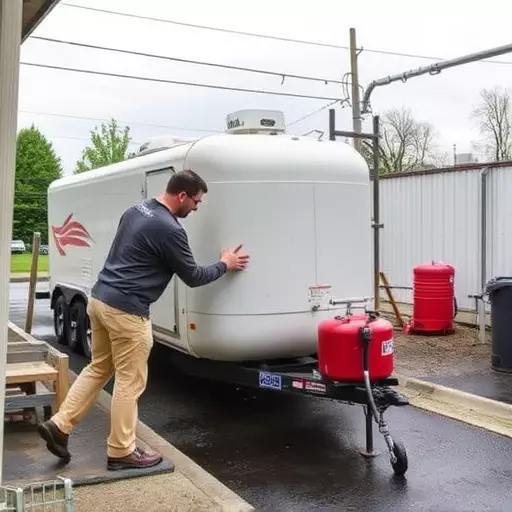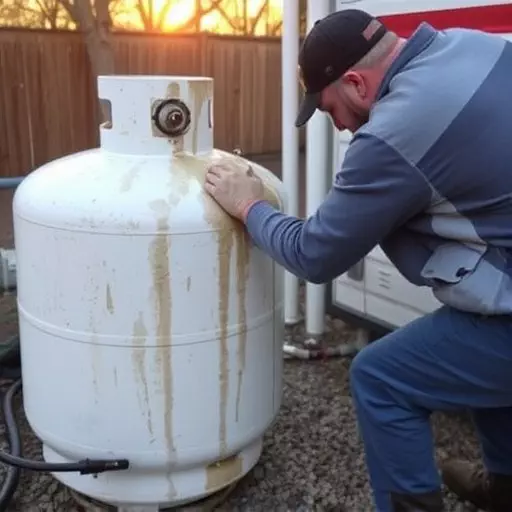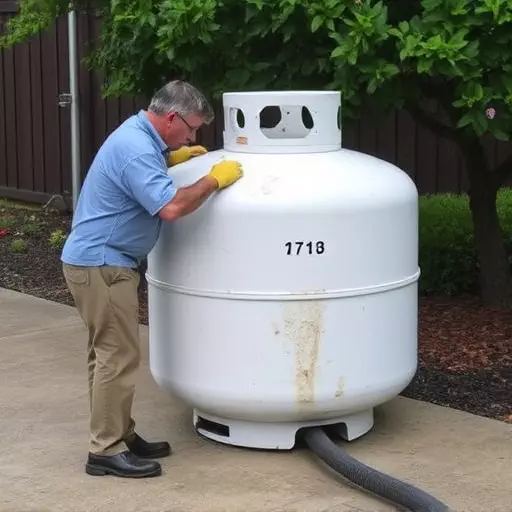Regular maintenance, including thorough cleaning and meticulous inspection, is essential for the safety and longevity of recreational propane tanks in Camden, New Jersey. Residents should visually inspect tanks for damage, corrosion, or leaks and address issues promptly with certified professionals. Cleaning involves removing debris from interior and exterior surfaces to preserve tank integrity. Regular checks on connections, valves, and pressure regulators are crucial. Following these practices ensures compliance with local regulations, providing safe and reliable propane tank usage for Camden residents.
“Maintaining recreational propane tanks is essential for safety and longevity, especially in vibrant locations like Camden, New Jersey. This guide delves into the critical aspects of recreational propane tank maintenance, focusing on proper cleaning techniques and meticulous inspection for damage. By understanding common signs of wear and following a step-by-step inspection process, users can ensure their tanks remain safe and functional. Adhering to local regulations and best practices is paramount, as Camden, NJ, enforces stringent standards to safeguard communities.”
- Understanding Recreational Propane Tank Maintenance
- The Importance of Proper Cleaning Techniques
- Identifying Common Signs of Damage
- Step-by-Step Guide to Inspecting Propane Tanks
- Best Practices for Ensuring Longevity
- Local Regulations and Safety Standards in Camden, New Jersey
Understanding Recreational Propane Tank Maintenance

Recreational propane tanks require regular maintenance to ensure safety and optimal performance. Camden, New Jersey residents should familiarize themselves with proper cleaning and inspecting procedures to prevent accidents and prolong tank lifespan. The process involves visually examining the tank for any signs of damage, corrosion, or leaks. Any abnormalities found during inspection should be addressed immediately by a certified professional.
Proper cleaning includes removing debris, rust, and buildup from both the exterior and interior of the tank. Using appropriate cleaning solutions and techniques, free from abrasive materials, helps maintain the tank’s integrity. Regular maintenance also encompasses checking connections, valves, and pressure regulators for wear or damage. By adhering to these practices, Camden residents can ensure their recreational propane tanks are safe, reliable, and in compliance with local regulations.
The Importance of Proper Cleaning Techniques

When it comes to recreational propane tank maintenance in Camden, New Jersey, proper cleaning techniques are paramount. Propane tanks, over time, can accumulate debris, dirt, and even rust, which not only impairs their performance but also poses potential safety risks. The process of inspecting propane tanks for damage must include a thorough cleaning to ensure any issues are identified early on. This is crucial for preventing leaks, explosions, or other hazardous incidents.
The proper cleaning of recreational propane tanks involves using appropriate tools and solutions designed for the task. Skilled professionals should employ specialized equipment like pressure washers to remove stubborn buildup without damaging the tank’s interior. Regular cleaning not only extends the lifespan of these tanks but also guarantees optimal gas efficiency. It’s a critical step in maintaining the integrity and safety of your recreational propane tank, whether for camping trips or other outdoor activities.
Identifying Common Signs of Damage

When it comes to recreational propane tank maintenance in Camden, New Jersey, knowing what to look for is crucial. Common signs of damage can include rusting, especially at seams and joints, which could indicate corrosion and compromise structural integrity. Other visible indicators are dents, cracks, or bulges on the tank’s surface – these defects may be a result of impact or pressure changes and should never be ignored. Leaks are another critical sign; they might not always be apparent but can be detected by a distinct odour or through visual inspection of the connections and fittings. Proper cleaning of recreational propane tanks is an essential part of this process, as it removes any buildup that could mask potential issues.
Regularly inspecting propane tanks for damage is vital for both safety and performance. Users should look out for signs of wear and tear, especially after frequent use or exposure to varying weather conditions. Moreover, checking for proper inflation pressure is key; an under-inflated tank can be a serious safety hazard and may lead to catastrophic failure. By being vigilant and following recommended maintenance practices, such as those outlined for recreational propane tank maintenance in Camden, New Jersey, users can ensure their tanks are safe and reliable for years to come.
Step-by-Step Guide to Inspecting Propane Tanks

Step-by-Step Guide to Inspecting Propane Tanks
Start by examining the propane tank for any visible signs of damage or corrosion. Check for dents, cracks, rust, or blisters on the tank’s surface. Pay close attention to areas where pressure valves, connections, and fittings are attached, as these can be points of weakness. Use a wire brush or scouring pad to gently scrub the tank, focusing on removing any built-up dirt or residue. Ensure proper cleaning by rinsing with warm water and mild detergent, then thoroughly drying the tank before proceeding.
Next, inspect all valves, regulators, and connections for leaks. Apply pressure to each component while observing for any gas escape. Visually check for signs of damage or misalignment that could lead to leaks. Additionally, test the pressure relief valve by gently pressing it to ensure it operates smoothly and releases pressure as designed. Regularly inspecting your recreational propane tank in Camden, New Jersey, is crucial for maintaining safety and preventing accidents. Proper cleaning and thorough inspecting routines are key components of recreational propane tank maintenance.
Best Practices for Ensuring Longevity

Proper cleaning and inspecting of recreational propane tanks is essential for ensuring their longevity and safety, especially in the dynamic landscape of outdoor activities like camping and BBQs in Camden, New Jersey. Start by regularly removing any debris or sediment that may have accumulated inside the tank over time. Use a suitable solvent or cleaning solution recommended by the manufacturer to gently clean the interior walls, eliminating any traces of oil, grease, or previous fuel residues. This process prevents potential clogs and ensures optimal performance when filling up your propane tanks.
Additionally, inspecting for damage is a crucial part of recreational propane tank maintenance. Examine the exterior for any signs of corrosion, cracks, dents, or leaks. Even the smallest damage can compromise structural integrity and lead to hazardous situations. If you notice any issues, it’s best to consult professionals who specialize in recreational propane tank maintenance to assess and address these problems promptly. Regular attention to cleaning and inspecting will extend the life of your propane tanks, ensuring safe and reliable performance during your outdoor adventures.
Local Regulations and Safety Standards in Camden, New Jersey

In Camden, New Jersey, both local regulations and safety standards play a vital role in ensuring the responsible use of recreational propane tanks. The city’s fire department and building code enforcement agencies have established guidelines for the proper cleaning and inspecting of recreational propane tanks to mitigate potential hazards. These standards include regular inspections to detect any signs of damage, corrosion, or leaks, emphasizing the importance of maintaining these tanks in good condition.
Camden residents and businesses utilizing recreational propane tanks are encouraged to familiarize themselves with these regulations to uphold safety protocols. Proper cleaning techniques, including the use of approved cleaning solutions and methods, are essential steps in inspecting propane tanks for damage. By adhering to these guidelines, Camden communities can help prevent accidents and ensure a safe environment for everyone involved.


